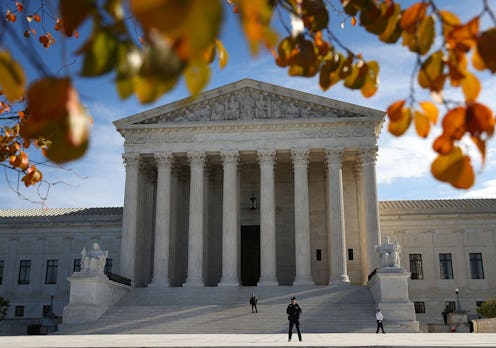News
Here's A Helpful Explainer About The Major News Coming Out Of The Supreme Court

Monday saw the Supreme Court issue a flurry of orders and decisions as it moves to wind down this year's term. With so much activity going on, it can be confusing to know what differentiates an order from an opinion or how sending a case back to a lower court for further consideration differs from denying a petition for writ of certiorari. Confused? Here's what you need to know about what's happening in the Supreme Court today.
The Supreme Court released a summary disposition Monday, in which it outlined a number of orders it had issued in more than a hundred cases. According to SCOTUS Blog, orders usually refer to "the actions that the court took at its most recent conference." They range from the court granting or denying requests for review to granting or denying other requests in pending cases.
The majority of the orders issued Monday were denials of certiorari, meaning the Supreme Court refused a formal request to review a ruling issued by a lower court. In fact, the Supreme Court issued orders of denied certiorari in more than 100 cases on Monday. In these instances, the ruling of the lower court stands as the final decision in the case.
Here's what went down in some of the day's more notable cases:
Klein v. Oregon Bureau of Labor and Industries
In a case regarding an Oregon baker who alleged the state drove them out of business after they'd refused to create a wedding cake for a same-sex couple, the Supreme Court issued what's known as a grant, vacate, remand (GVR) order. While the court granted a petition for certiorari, they ultimately opted not to directly weigh in on the case themselves or hear oral arguments in the case next term.
Instead the court scrapped a decision the lower court had made in favor of the same-sex couple and sent the case of Klein v. Oregon Bureau of Labor Industries back to the Court of Appeals of Oregon for further consideration.
What's more, in remanding the case to a lower court, the Supreme Court asked them to reconsider their judgement in light of the ruling handed down last year in the Masterpiece Cakeshop case. Last June, the Supreme Court ruled 7-2 in favor of a Colorado baker who'd cited religious objection as grounds for his refusal to make a cake celebrating the union of a same-sex couple.
According to CNN, Supreme Court justices discussed the Klein case in private, closed-door conferences for more than three months, which "suggests the justices were debating different ways of resolving the case, short of putting it on the calendar for next term."
The Little Sisters of the Poor Jeanne Jugan Residence v. California
Among the many orders regarding certiorari that were issued Monday was a request to take up a case alleging that the Affordable Care Act's contraceptive coverage mandate represented a violation of the Religious Freedom Restoration Act. The Supreme Court declined to review the case.
The case, which was brought forth by a Roman Catholic order of nuns known as the Little Sisters of the Poor, sought to challenge rulings from lower courts that effectively blocked the Trump administration from weakening the contraceptive coverage mandate. Per the Supreme Court's denial of certiorari, however, the lower court's ruling in this case stands.
Gamble v. the United States
Along with its lengthy list of orders, the Supreme Court also moved Monday to issue a ruling in the highly publicized "double jeopardy" case. In Gamble v. the United States, an Alabama man alleged the Constitution's double jeopardy prohibition should prevent the federal government from being able to hit him with charges related to an offense he'd already pleaded guilty to — and been sentenced for — in a state court.
In a 7-2 ruling, the Supreme Court upheld the legal principle of dual sovereignty, which enables the federal government to levy charges against individuals already tried or convicted in a state court and vice versa. According to Politico, the case had been closely followed as a ruling overturning the dual sovereigns principle would likely have impacted state prosecutors' attempts to limit the potential impact pardons issued by President Donald Trump (to say, former Trump campaign chairman Paul Manafort) might have.
According to the Supreme Court, more and more requests to review new cases are being filed with the top court now than have ever been filed in the previous century. In fact, the Supreme Court has approximated that 7,000 to 8,000 new cases are filed each year, a significant increase from the 1,195 new cases received in 1950 or the 3,940 received in 1975. Of course, not every case gets reviewed by the court. But if Monday's flurry of activity is any indication, Supreme Court justices are no stranger to working on the weekend.